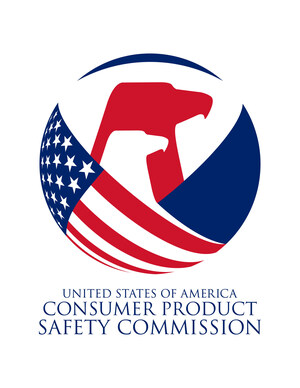WASHINGTON, June 17, 2014 /PRNewswire-USNewswire/ -- During International Product Safety Week (June 16-20, 2014), a bi-annual meeting of government, industry and consumer organizations, the U.S. Consumer Product Safety Commission (CPSC) and counterparts from 12 other countries and jurisdictions teamed up to make button battery safety a global priority.
At a press event today in Brussels, Belgium, CPSC representatives and the Organisation for Economic Co-operation and Development (OECD) discussed dangers associated with coin-size batteries.
Larger button batteries, also known as coin cell batteries, are used in an increasing number of small electronics around the home, including keyless entry devices, scales and calculators. These and other small electronics frequently are left within a child's reach. Incidents of young children and seniors unintentionally swallowing the batteries have resulted in thousands of reports of injuries worldwide.
The consequences of swallowing a coin size battery can be immediate and devastating. Fatal chemical burns from a coin cell battery lodged in the throat can occur in as little as two hours.
"We are pleased to participate in this international information and awareness effort on button battery safety," said CPSC Acting Chairman Bob Adler. "Preventing battery-related incidents is a priority at CPSC. Today, our collective voices in this worldwide effort will make this a global priority."
International Awareness Week – Participating Countries and Jurisdictions
| Australia |
Brazil |
Canada |
| Colombia |
Korea |
Peru |
| EU |
Latvia |
USA |
| France |
Mexico |
|
| Japan |
New Zealand |
CPSC reached out to battery manufacturers and is encouraged by recent efforts that have resulted in new safety warnings and packaging changes. CPSC is working with industry, public health officials and the global community to continue the progress of preventing coin cell battery-related incidents.
Parents and caregivers are urged to keep products containing these batteries away from children. CPSC recommends the following steps to prevent unintentional battery ingestion:
- Do not allow children to play with or be in contact with coin cell batteries.
- Caution hearing aid users to keep hearing aids and batteries out of the reach of children.
- Never put batteries in your mouth for any reason because they are easily swallowed accidentally.
- Always check medications before ingesting them. Adults have swallowed button batteries mistaking them for pills or tablets.
- Keep remotes and other electronics out of your child's reach if the battery compartments do not have a screw to secure them. Use tape to help secure the battery compartment.
- If a button battery is ingested, seek medical attention immediately. The National Battery Ingestion and Poison Help Hotlines are available 24 hours a day.
- Discard button batteries carefully.
Join the international button battery safety campaign online by using the hash tag: #worldbatterysafety.
| Country |
Link to Information |
| Australia |
Australian button battery safety video: http://www.youtube.com/watch?v=_mGr24ZD4PE
|
| Brazil |
Website: https://www.inmetro.gov.br |
| Canada |
|
| Colombia |
Facebook: https://www.facebook.com/Superintendenciadeindustriaycomercio
|
| European Commission |
Twitter: @EU_consumer |
| France |
Facebook : https://www.facebook.com/pages/ALERTES-PRESSE-DGCCRF/174644682627095?fref=ts
|
| Japan |
Website: http://www.caa.go.jp/index.html
|
| Korea |
Facebook: https://www.facebook.com/consumersafe |
| Latvia |
Facebook: https://www.facebook.com/ptacgovlv
|
| Peru |
Facebook: www.facebook.com/IndecopiOficial
|
| U.S. |
Website: http://www.cpsc.gov/en/Newsroom/Multimedia/?vid=62257 |
The U.S. Consumer Product Safety Commission is charged with protecting the public from unreasonable risks of injury or death associated with the use of thousands of types of consumer products under the agency's jurisdiction. Deaths, injuries, and property damage from consumer product incidents cost the nation more than $1 trillion annually. CPSC is committed to protecting consumers and families from products that pose a fire, electrical, chemical or mechanical hazard. CPSC's work to ensure the safety of consumer products - such as toys, cribs, power tools, cigarette lighters and household chemicals – contributed to a decline in the rate of deaths and injuries associated with consumer products over the past 40 years.
Federal law bars any person from selling products subject to a publicly-announced voluntary recall by a manufacturer or a mandatory recall ordered by the Commission.
To report a dangerous product or a product-related injury go online to www.SaferProducts.gov or call CPSC's Hotline at (800) 638-2772 or teletypewriter at (301) 595-7054 for the hearing impaired. Consumers can obtain news release and recall information at www.cpsc.gov, on Twitter @USCPSC or by subscribing to CPSC's free e-mail newsletters.
Media Contact
Please use the phone numbers below for all media requests.
Phone: (301) 504-7908
Spanish: (301) 504-7800
Logo - http://photos.prnewswire.com/prnh/20030904/USCSCLOGO
SOURCE U.S. Consumer Product Safety Commission
WANT YOUR COMPANY'S NEWS FEATURED ON PRNEWSWIRE.COM?
Newsrooms &
Influencers
Digital Media
Outlets
Journalists
Opted In




Share this article